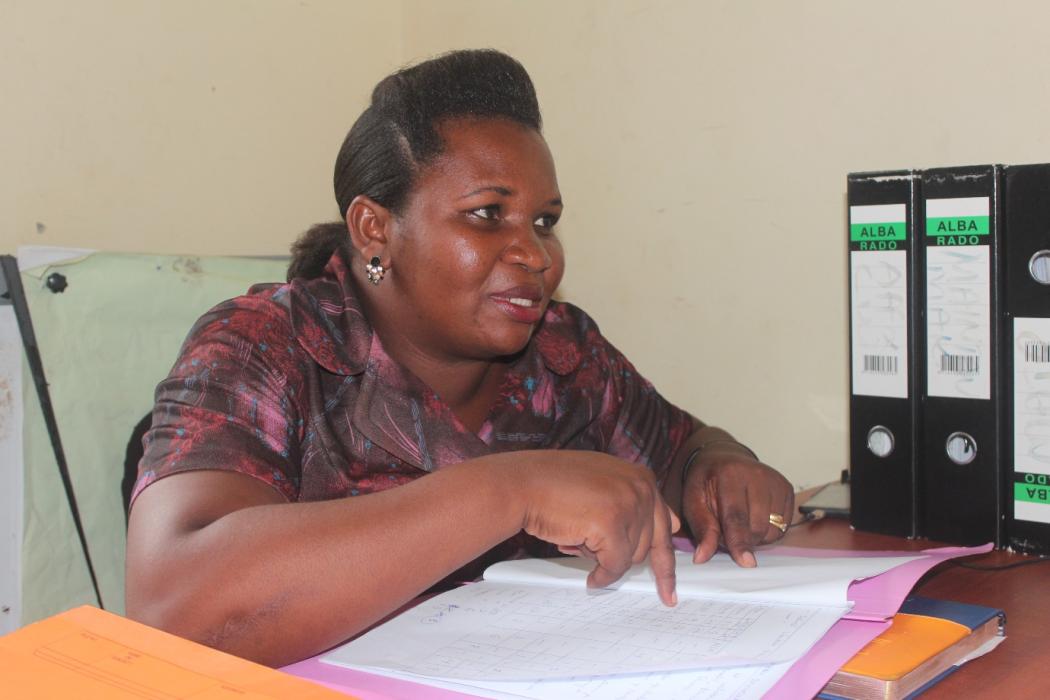Tanzania’s New Task Sharing Policy Puts Social Service Workers on the Frontlines of HIV/AIDS Care

As Tanzania looks to task sharing as a way to improve access to much-needed health and social support services, social service workers like Stellah Kihombo (left) play a crucial role in identifying people in need, providing psycho-social support, and linkages to crucial HIV/AIDS prevention, care, and treatment services for high-risk populations across the country. Courtesy AIHA.
By Ronald Nakaka and Kathryn Utan, American International Health Alliance (AIHA)
Stellah Kihombo provides social support services out of a small municipal office in Chanika ward, which is situated about 13 miles outside of Tanzania’s business capital of Dar es Salaam. The 34-year-old social worker serves her own community, along with eight neighboring villages within the ward. In each village, there is a para social worker — a community volunteer who has been trained to provide basic social welfare services at the household level — working under Stellah’s close supervision and mentorship.
“About five months ago, I received a call from one of the para social workers regarding a 16-year-old girl in need of an urgent intervention,” Stellah recounts. “The young girl exhibited what constituted risky behaviors that put her in danger of not only contracting HIV, but also going on to infect multiple people,” Stellah said, explaining that upon counseling the girl, she learned more about her circumstances.
“The girl was in a highly vulnerable situation because she had been a victim of rape at the delicate age of six. She lived in a poverty stricken, broken family and had experienced prolonged abuse,” Stellah said, noting that the girl was now engaged in commercial sex work and had dropped out of school.
“I provided psycho-social support to the girl, encouraged her to get tested for HIV, and referred her to a nearby health facility where she could receive more comprehensive care, including preventive care and other screening or treatment services,” Stellah explains. “I also linked her to a community-based organization that empowers young women to engage in dignified and sustainable livelihoods through training in tailoring and entrepreneurship,” she says, noting that she continues to work closely with the village parasocial worker to provide support to the young girl.
“She no longer lives as a sex worker,” Stellah reports happily.
In Tanzania, social service workers like Stellah have officially moved to the frontlines of the country’s war against HIV/AIDS thanks to a new task sharing policy launched in 2016.
Task sharing is a critical mechanism helping Tanzania achieve the UNAIDS 90-90-90 targets of getting 90% of all of people living with HIV aware of their status, 90% of those diagnosed on sustained antiretroviral treatment, and 90% of those on treatment maintaining durable viral suppression by 2020. It also supports the goals of the U.S. President’s Emergency Plan for AIDS Relief (PEPFAR) to achieve an AIDS-free generation.
The American International Health Alliance (AIHA) supported the roll out of a training program for social workers from more than 40 districts with high HIV/AIDS burden across Tanzania. The training helped these critical frontline caregivers develop unique competencies needed to provide client-friendly, stigma-free services to key populations, including female sex workers. It also provided useful strategies for effectively identifying and reaching out to female sex workers and other key populations.
Stellah reports that many barriers exist for at-risk populations looking to access HIV/AIDS services, including stigma and discrimination in the community and unfriendly political environment.
“I continue to educate my community, starting with village leaders, as a way to raise awareness and break down these barriers,” Stellah says. “I attended AIHA’s Comprehensive HIV/AIDS Services for Key Populations training program in February 2016. The training has made me a role model in my community, where I have received many invitations to share my knowledge about HIV/AIDS, gender-based violence, and child protection through various social spaces and platforms, including local churches,” she explains.
AIHA’s national-level work to strengthen Tanzania’s social work and nursing cadres — both critical to Tanzania’s task sharing strategy — is supported by the American people with funding from the U.S. President’s Emergency Plan for AIDS Relief (PEPFAR) through the U.S. Centers for Disease Control and Prevention (CDC), Tanzania. Both projects are implemented through AIHA’s HIV/AIDS Twinning Center Program, which is funded through a cooperative agreement with the U.S. Department of Health and Human Services, Health Resources and Services Administration (HRSA).
